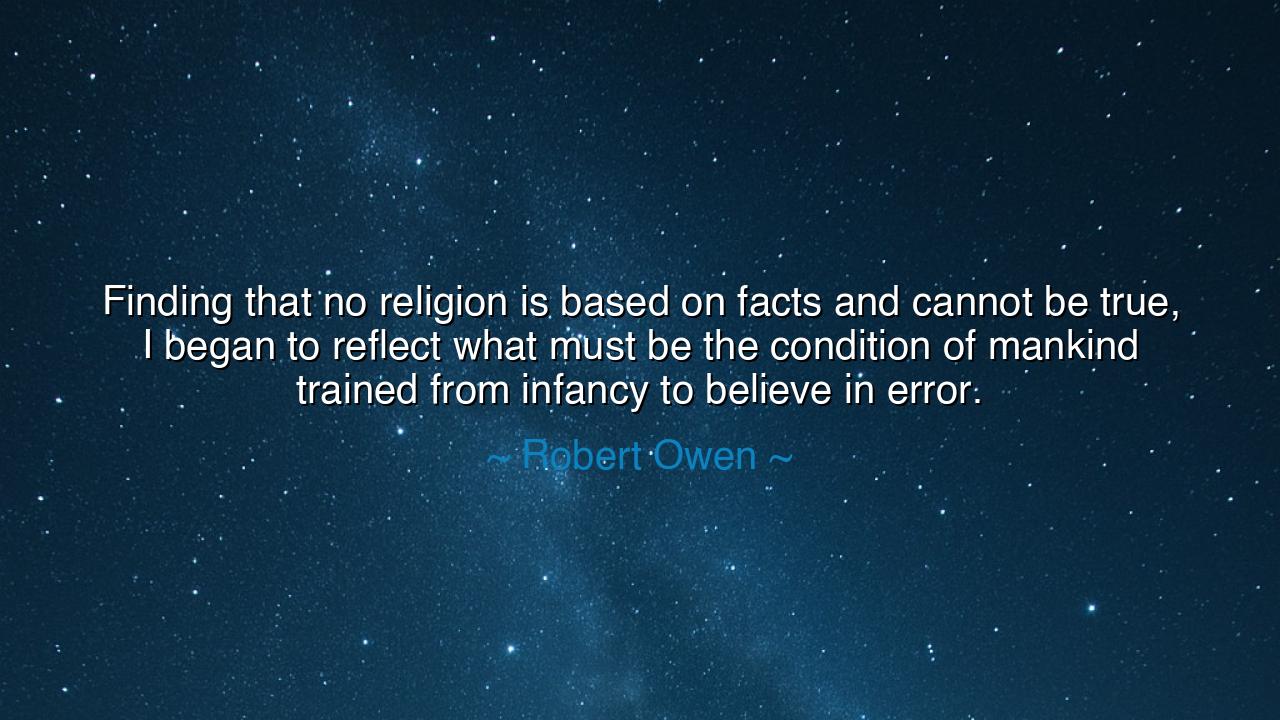
Finding that no religion is based on facts and cannot be true, I
Finding that no religion is based on facts and cannot be true, I began to reflect what must be the condition of mankind trained from infancy to believe in error.






Hear the bold and searching words of Robert Owen, who declared: “Finding that no religion is based on facts and cannot be true, I began to reflect what must be the condition of mankind trained from infancy to believe in error.” These words are not the quiet musings of a man content with tradition, but the fiery challenge of one who sought to strip away illusion and examine the foundations of human belief. In them we hear both the skepticism of reason and the compassion of one who worried for humanity’s fate if raised upon falsehoods.
The origin of this saying lies in the age of the Enlightenment and the dawn of industrial society, when Owen, a social reformer and industrialist, began to question not only economic systems but also spiritual ones. He looked upon religion, not as a sacred vessel of truth, but as a creation of men, passed down to children as unquestioned law. To him, the tragedy was not only in the untruth itself, but in the shaping of minds from their earliest years to accept error as unquestionable fact. This, he believed, enslaved not only the body but the soul.
History gives us examples of the weight of this thought. Recall the Inquisition, when children were taught that questioning dogma was sin, and countless lives were burned at the stake for straying from accepted belief. Entire generations grew in fear, their thoughts bound, their voices silenced. Owen’s words echo across such times, mourning not only the cruelty of rulers but the chains placed upon young minds before they could reason for themselves. What hope, he asked, for mankind, if the mind is molded in error from birth?
Yet there is also hope hidden in his lament. For history shows that even when men are trained in falsehood, the flame of truth cannot be extinguished forever. Galileo, raised in a deeply religious world, looked through his telescope and saw a universe that contradicted ancient teachings. Though condemned, he planted seeds of knowledge that would bloom centuries later. In this, we see the power of reason to break free from error, and the possibility that even those trained from infancy may awaken to truth.
Owen’s words also speak beyond religion, touching upon every system that teaches unquestioned obedience. Nations have raised children to worship tyrants, to believe in lies of race or class, to accept cruelty as virtue. Each time, the result has been sorrow, war, and injustice. To train from infancy in error is to sow the seeds of destruction, and the harvest is bitter indeed. Thus, Owen warns us not only of religion, but of every falsehood handed down as unexamined truth.
The lesson, O listener of tomorrow, is this: question what you are taught. Do not swallow beliefs blindly, no matter how ancient or widely held. Test them against evidence, against reason, against the whisper of conscience. If you find truth, hold it firmly. If you find error, cast it away, no matter how cherished it may be. For only in this way can mankind escape the prison of falsehood and grow into the freedom of wisdom.
Therefore, take action. When you teach the young, teach them not what to think but how to think. Encourage curiosity, not fear. Cultivate honesty, not blind loyalty. Remember that to train a child in error is to chain a soul, but to nurture a questioning mind is to set a spirit free. In doing so, you will honor the cry of Robert Owen, and you will help shape a future where mankind no longer bows to falsehood, but stands upright in the light of truth.






AAdministratorAdministrator
Welcome, honored guests. Please leave a comment, we will respond soon